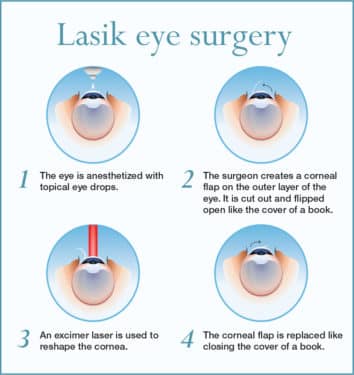Refractive Lens Exchange: A Considerable Guide For Superior Vision
Refractive Lens Exchange: A Considerable Guide For Superior Vision
Blog Article
Authored By-Mitchell Velasquez
If you more than 40 and dealing with vision issues like hyperopia or nearsightedness, Refractive Lens Exchange (RLE) might be worth taking into consideration. This procedure replaces your natural lens with a synthetic one, potentially lowering your dependancy on glasses. While the benefits are appealing, it's critical to recognize the dangers and qualification needs. What should you recognize prior to making a decision that could alter your vision permanently? Allow's explore this subject even more.
Comprehending Refractive Lens Exchange
Recognizing Refractive Lens Exchange (RLE) can be crucial for those thinking about vision improvement options.
RLE is a surgical procedure that changes your eye's all-natural lens with an artificial intraocular lens. It's mainly focused on fixing severe refractive mistakes, such as hyperopia, nearsightedness, or presbyopia.
Throughout the treatment, your surgeon will certainly remove your gloomy or clear lens and change it with a lens tailored to your vision needs. This alternative is typically taken into consideration for people over 40 who might not be suitable candidates for LASIK.
By picking RLE, you're not just improving your vision; you're additionally potentially minimizing your reliance on glasses or contact lenses.
Understanding just how RLE jobs will empower you to make enlightened decisions concerning your vision health.
Conveniences and Risks of RLE
Choosing RLE not only provides a chance to improve your vision however additionally comes with its own set of benefits and threats.
One significant benefit is the potential for more clear vision, minimizing or removing your reliance on glasses or get in touch with lenses. You might also experience a more comprehensive range of vision, particularly if you choose multifocal lenses.
Nevertheless, there are risks included, such as infection, issues throughout surgery, or frustration with the results. https://prosandconsofmonovision73849.blog-mall.com/36209455/opening-the-mystery-of-prescription-eye-drops-for-dry-eye-alleviation experience visual disruptions like halos or glare.
It's necessary to weigh these benefits and risks meticulously. Consulting with your eye care professional can assist you make an informed decision that lines up with your vision goals and way of life.
Eligibility Criteria for Refractive Lens Exchange
Prior to thinking about Refractive Lens Exchange (RLE), it's vital to determine if you satisfy the eligibility standards. Normally, you're a good candidate if you more than 40 years of ages and have a secure prescription.
You should also be experiencing refractive mistakes like myopia, hyperopia, or presbyopia. Las Vegas Md is very important to have healthy eyes without any substantial illness, such as cataracts or glaucoma.
In addition, you should remain in excellent total health and not have any problems that might influence recovery, like uncontrolled diabetic issues. If how to treat eye after cataract surgery wear contact lenses, you may require to quit using them for a while prior to your evaluation.
Consulting with an eye care expert will certainly assist you understand your particular circumstance and whether RLE is right for you.
Verdict
Finally, refractive lens exchange can change your vision and lower your dependence on glasses or get in touches with. While it offers many advantages, it's essential to understand the risks and ensure you meet the qualification criteria. Consulting with simply click the following site will certainly assist you make an educated choice tailored to your requirements. If you're taking into consideration RLE, put in the time to explore your alternatives and discuss any kind of worries, leading the way for more clear, much more lively sight.
